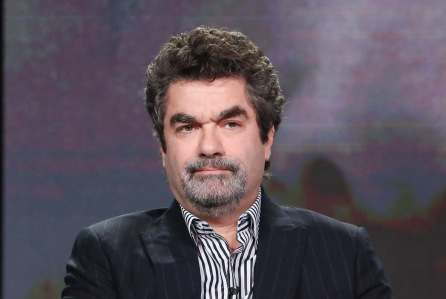Oscar-nominated filmmaker Joe Berlinger doesn’t mind taking on some powerful forces.
He squared off with oil giant Chevron in Crude. In the Paradise Lost trilogy, he went up against prosecutors in the notorious case of the West Memphis Three. With his latest film, Intent to Destroy, he’s running afoul of the government of the Republic of Turkey.
“Bring it on, that’s my attitude,” Berlinger tells Deadline.
Intent to Destroy, which recently qualified for Oscar consideration, recounts the Armenian Genocide that began in 1915 — the massacre of up to 1.5 million Armenians that most historians believe was planned and implemented by the Ottoman state in its waning years. The film likewise explores the policy of genocide denial vigorously maintained by modern-day Turkey, which rose from the ashes of the Ottoman Empire.
“I was not really interested in just telling the story of the genocide. But I wanted to tell the story about denial,” Berlinger says. “To me only part of the film is about the actual facts of the genocide. The rest of the film is about the aftermath of denial, the mechanism of denial.”
There is a film within Berlinger’s film—the 2016 historical epic The Promise, starring Christian Bale and Oscar Isaac, that dramatized the events of the Armenian Genocide. Berlinger spent considerable time documenting the production on location in Portugal, Spain and Malta. In Intent to Destroy he interweaves archival recollections from actual genocide survivors, interviews with historians and prominent Armenian-Americans with clips from The Promise and behind-the-scenes footage.
Berlinger captures a powerful moment off set when Oscar-nominated actress Shohreh Aghdashloo, cast in The Promise as a genocide victim, breaks down after filming an emotional scene. And he interviews actor Daniel Giménez Cacho, who nervously explains that a Turkish ambassador tried to convince him — after learning Cacho had been cast in The Promise — that a genocide never occurred.
“The making of The Promise provided that perfect vehicle to tell that story,” Berlinger explains. “For me as a filmmaker who’s much more comfortable telling a present-tense story, it gave me some present-tense narrative thread to hang all the history on.”
Berlinger includes scenes from The Promise that reenact what continues to be a cherished memory for Armenians today, when thousands of their ancestors escaped slaughter by Ottoman forces on the mountain of Musa Dagh. The story was told in Franz Werfel’s 1933 novel The Forty Days of Musa Dagh and and shortly after its publication, MGM acquired the rights for an adaptation that was to star Clark Gable. But the film never came to be.
“Anytime in Hollywood an Armenian Genocide movie’s been attempted to be made, it’s been canned because of Turkish pressure,” Berlinger asserts. “[Producer] Irving Thalberg was going to make The Forty Days of Musa Dagh and was told by the State Department, ‘Drop the project.’”
Berlinger says The Promise only got made because it was independently financed by the estate of Kirk Kerkorian, the Armenian-American billionaire who died in 2015.
“It was actually Kirk Kerkorian’s wish to make The Promise,” Berlinger notes.
The Turkish government cast aspersions on The Promise and feels similarly about Berlinger’s documentary.
“We believe that such productions hurt the potential reconciliation process,” reads a statement emailed to Deadline from the Turkish Consulate in Los Angeles.
The consulate attached a four-page document outlining the official government position on the mass killings which states, in part, “Turkey does not deny the suffering and the losses of Armenians during World War I… While it is true that hundreds of thousands of Ottoman Armenian citizens died or were relocated within the Ottoman territories, it is also true that 2.5 million Ottoman Muslims died, 5 million of them were relocated during the same period. The suffering under war conditions affected all of the Ottoman citizens. Therefore, if we are going to talk about justice, the memory of all those who died during World War I should be respected.”
The document adds, “Turkey does not agree that the events were tantamount to genocide.” And it points out that genocide is a legal term: “Genocide implies that there is a perpetrator and a victim and the two are separated clearly in black and white manner. Such was the case during the Holocaust. The same cannot be said for the events of 1915…”
Indeed, the title of Berlinger’s documentary, Intent to Destroy, comes from Article II of the U.N. convention on genocide, which provides a legal definition of genocide as “acts committed with intent to destroy, in whole or in part, a national, ethnical, racial or religious group.”
In 2016 Pope Francis used the term “Armenian Genocide” to characterize the slaughter. U.S. presidential administrations from George H.W. Bush onward have tiptoed around the issue, fearful of antagonizing Turkey, a vital strategic partner and NATO ally.
“The U.S. has kind of made a deal with the devil to help this country deny its genocide so that we would have access to air force bases and listening posts during the Cold War and later all of the unrest in the Middle East and the two Iraq wars,” Berlinger maintains.
Intent to Destroy opens Friday in New York, Pasadena and Glendale, California—the latter city, home to a large Armenian-American population. The film will later be released on iTunes and will play on the Starz cable channel in 2018.














